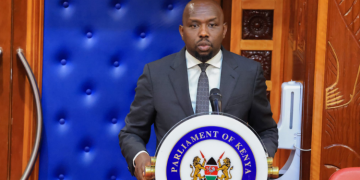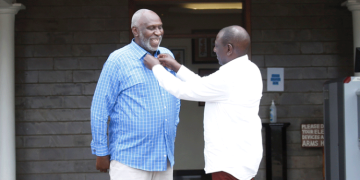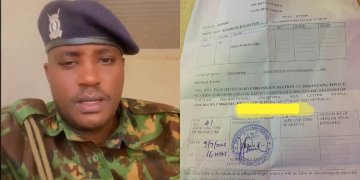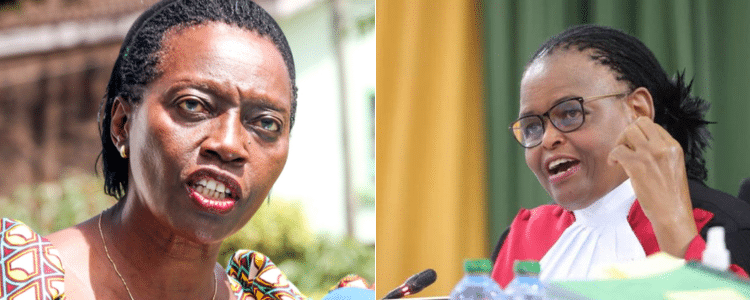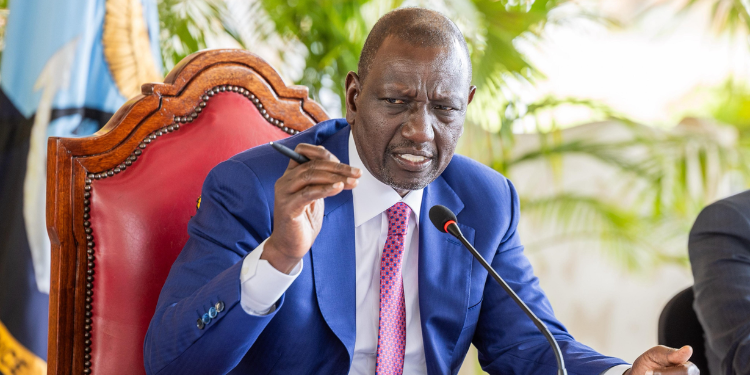The Supreme Court of Kenya has dismissed a case implicating Narc Kenya Party leader Martha Karua against the apex court holding that its decisions are not subject to review or appeal at the East Africa Court of Justice (EACJ).
The ruling delivered on May 31, 2024, maintained that the Supreme Court had jurisdiction to render the advisory opinion on matters pending litigation or concluded litigation at the EACJ, and that decisions made by the country’s apex court could not be overturned.
This followed an advisory opinion sought by Attorney General Justin Muturi on behalf of the National Government where Karua who was enjoined by the Court as an Intervener.
Karua had raised a Preliminary Objection dated 6th October 2023 on whether the decisions by the Supreme Court on Kenyan law may be subject to a merit review by the EACJ.
In the case, the Narc leader had made a submission that the Court lacked jurisdiction to hear and determine the Reference Case because it did not concern a county government.
“The Supreme Court exercises its mandate as provided for under the Constitution while EACJ exercises its mandate under the EAC Treaty. The EACJ is not part of the hierarchy of courts in Kenya and therefore, the Court cannot fail to issue an advisory opinion regarding matters pending or concluded at the EACJ, because of the difference in jurisdiction and authority,” reads part of the ruling.

In his submission, AG Muturi further sought what would be the legal consequences upon the sovereignty of the people of Kenya and the Government if orders of the EACJ premised on a differing interpretation of the Kenyan Law from that held by the Supreme Court.
Supreme Court ruling
According to the ruling, a state’s electoral laws and procedures fall squarely within the municipal competency of its courts.
Also Read: Martha Karua Puts Govt to Task Over Miraa, Muguka Ban
“It is juridically inconceivable that a regional tribunal, established by a regional Treaty, whose objectives are clearly decreed as in the EAC Treaty can arrogate to itself an appellate jurisdiction, in matters involving the interpretation of a member state’s Constitution by its own courts,” notes the apex Court.
The genesis of the case can be traced to the gubernatorial elections for Kirinyaga County held in 2017 where Karua filed a case at EACJ following her loss in the election.
Karua who suffered defeat to current Kirinyaga Governor Anne Waiguru was aggrieved by the declared election result and filed a petition at Kerugoya High Court to contest the result.
The High Court however struck out the petition in November 2017 resulting in Karua appealing at the Court of Appeal.
Karua Dissatisfied with 2017 Election Results
Further, vide a judgment delivered on 2nd March 2018, the appellate court set aside the High Court judgment and remitted the case back to the High Court to be heard on merits.
The High Court heard the petition on merits as directed and proceeded to dismiss it.
Karua appealed to the Court of Appeal again at Nyeri where a cross-appeal was filed in the matter by Governor Waiguru, the winner of the electoral contest.
However, the Court of Appeal found no merit in the appeal including the claim of violation of Karua’s right to fair trial by the High Court.
On appeal to the Supreme Court, the Court agreed with the Court of Appeal and held that the determination at the High Court was a nullity having been undertaken outside the statutorily prescribed limits.
It declined to consider any other issue on account of want of jurisdiction and dismissed the appeal.
Having exhausted the domestic remedies available in Kenya, the Narc leader filed a case at the against AG Muturi faulting the decision of the Supreme Court.
EACJ Ruling
EACJ’s First Instance Division agreed with her and found that the Supreme Court’s interpretation of the Constitution was wrong.
The ruling further stated that the State had violated Karua’s right to access to justice through its judicial organs.
It further held that Kenya violated its commitment to the fundamental and operational principles of the EAC Treaty by not properly interpreting and giving effect to the Constitution of Kenya.
Karua was consequently awarded with a compensation in general damages of $25,000 with simple interest of 6% per annum from the date of judgment until payment in full, including costs.
Aggrieved, the AG appealed to the Appellate Division of the EACJ which dismissed the appeal and upheld the decision of the First Instance Division of that court.
Follow our WhatsApp Channel for real-time news updates:
https://whatsapp.com/channel/0029VaB3k54HltYFiQ1f2i2C



